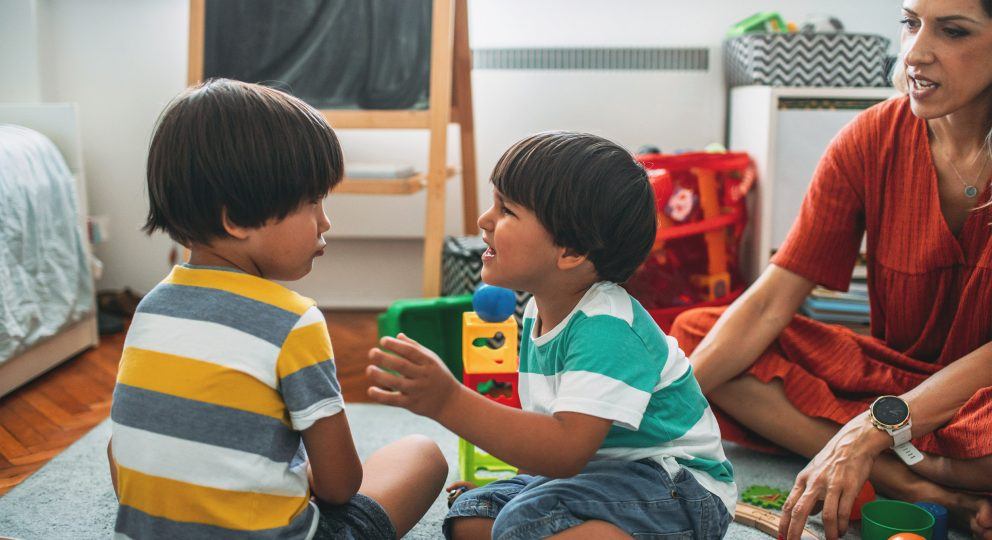Wouldn’t it be great if you could put down your referee whistle and instead use tools to regulate conflict between kids? Well, you can!
Conflict exists in every relationship. If you arm yourself with evidence-based parenting tools, such as Emotion Coaching, to navigate conflict, you will manage these moments with greater ease and confidence. You will also teach your children valuable life skills that they can take to the playground and then to the workplace one day.
Using Emotion Coaching takes some practice and time at first. However, once everyone gets used to it, these conversations will become second nature. Also, you won’t have to intervene as often.
The five steps
There are five simple steps to an Emotion Coaching conversation. By following them as prescribed by Dr. John Gottman in his book “Raising an Emotionally Intelligent Child”, you create a more nurturing home environment and strong relationships based on mutual trust and respect—with your children and between your children.
The steps are simple. Calming down and applying them is the trick. Let’s walk through the basic steps to having an Emotion Coaching conversation.
Step one: Tune in
The first step is simply tuning into your children’s lower-intensity emotions. These are the ones you can identify such as when your child scrunches their eyebrows, balls up their fists, or drops their shoulders. These are the little cues that let you know something is off before the bigger emotions escalate.
Step two: Make a choice
It is easy for us as parents to react to our children. Instead, we need to view these challenging moments as a gift. They allow us to respond, connect, and teach every time our children act out or become emotional. This perspective is an intentional choice that you need to make. I try to imagine a big, beautiful gift before me with a shiny red bow on it. This conflict can be an opportunity to create connection and intimacy.
Step three: Listen
This step is the simplest but often the hardest. Let each of your children feel heard by simply letting them tell their story. Ask, “What’s going on?” to each of them. They each get a turn speaking their side. Once they have shared, reflect back and paraphrase what you heard them say while both validating and empathizing.
Step four: Help them label their emotions
Don’t tell your children how they feel. When we do this, we are stoking the power-and-control fire and inviting resistance. Nobody likes to be told how they feel! You can instead ask, “How did it feel when _____?”
If your kiddos cannot identify an emotion, provide them with a few to choose from that you feel might be apt. For example, “Are you frustrated, sad, or disappointed?” Many times, kids aren’t even aware of how they feel; they are just reacting to it. By helping kids identify and communicate verbally how they are feeling, we empower them to express themselves in a more positive, effective, and socially acceptable way.
Step five: Set limits while problem-solving
This is where the meat of the conversation takes place. You want to start by…
- Acknowledging the feeling/need/desire and setting a limit on the behavior or action. It can sound like, “It’s okay to feel/want ___________, but it’s not okay to do ____________.”
- Help your child identify their goal or desire. All behavior is purposeful. Sometimes we need to be a detective and get underneath what we are seeing on the surface. Here we can simply ask, “What did you want?” or “What did you need?”
- Once we know what they wanted or needed, we can brainstorm some other ways to meet it. We can start by asking them, “What is a different way to get that?” Or we can coach them to come up with ideas by using us as a resource: “Do you want to know what other kids have done in situations like this?” or “Do you want to know what I did as a little kid when this happened to me?” We can even remind them of successful ideas they used in the past in similar situations: “Remember the last time you really wanted __________? What did you do/say that time?”
- Once you have a list of at least two or three ideas, evaluate each of them so your child can best choose their next course of action. Walk them through by asking, “What would happen if you did __________? How would the other person feel? How do you think I would react?” This helps your child connect the dots and identify the possible outcomes or consequences for each of their options. It can be helpful to use your family’s rules or values as a guide to assess each of the ideas.
- Last, you let your child choose. Ask, “You can try again. So what are you going to try now?” or “What do you plan to do next time this comes up?” It is best that your child chooses because they are more likely to follow through if the idea was a result of their own brainstorming and choice.
Two (or three) steps at a time
Each of these steps is a little gem in and of itself. You don’t have to use the entire framework to have meaningful and effective conversations. A great way to start adding Emotion Coaching into your parenting toolbox is by practicing two or three of the steps that you think will enhance the conflict regulation conversations you already have with your children. You and your children will be grateful, and things in your home will begin to feel a bit lighter.










